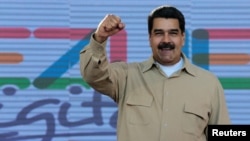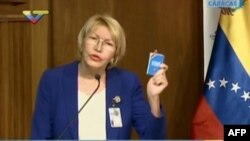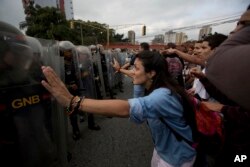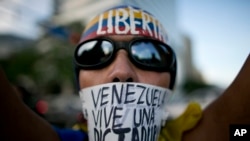Venezuela's President Nicolas Maduro said on Friday he would resolve within hours controversy over the judiciary's annulment of congress which has sparked opposition protests and condemnation from around the world.
"I hope to have very good news this evening and clear up the controversy generated," Maduro said in a speech, calling a meeting of the state security council to discuss the attorney general's criticism of the Supreme Court's decision.
The court's ruling that it was assuming the functions of the opposition-led National Assembly was lambasted as a "coup" by critics who viewed it as a lurch into dictatorship by the Socialist Party that has ruled for the last 18 years.
Seeking to project himself as above a fray between independent powers and possibly presaging a U-turn by the Supreme Court, Maduro said he had known nothing in advance of its ruling but would immediately address the matter.
In a rare show of dissent from a senior official, Venezuela's powerful attorney general Luisa Ortega, long an ally of Maduro, rebuked the court earlier on Friday.
"It constitutes a rupture of the constitutional order," the 59-year-old said in a speech on state television. "It's my obligation to express my great concern to the country."
Throughout Friday, pockets of protesters blocked roads, unfurled banners and chanted slogans against Maduro's unpopular government, including "Freedom!" and "No To Dictatorship!"
In volatile western Tachira state, several dozen demonstrators tore up copies of court sentences in front of local judicial buildings.
Having already shot down most of the National Assembly's measures since the opposition won control in 2015, the pro-Maduro Supreme Court on Wednesday said it was taking over the legislature's role because it was in "contempt" of the law.
The Supreme Court went into session from Friday afternoon, further fueling rumors of a row-back to diffuse the controversy.
New court president Maikel Moreno had called a news conference late afternoon, but it was swiftly cancelled, with Maduro taking to state airwaves instead to address a technology conference.
Bonds Fall
Venezuelan bonds fell sharply on the uncertainty, with the country's benchmark Global 2027 down around 7 percent.
The country's currency fell 9 percent on the black market against the dollar.
Maduro, 54, a former bus driver and self-declared "son" of late leftist predecessor Hugo Chavez, was narrowly elected in 2013 amid widespread support for the ruling Socialist Party's oil-fueled welfare programs.
But his ratings have plummeted to just over 20 percent as Venezuelans struggle with a fourth year of recession, scarcities of food and medicines and the highest inflation in the world.
Critics blame a failing socialist system, whereas the government says its enemies are waging an "economic war." The fall in oil prices since mid-2014 has exacerbated the crisis.
The court's move brought condemnations and concern from the United States, Organization of American States (OAS), European Union, United Nations and major Latin American nations.
Ally Russia bucked the trend in a statement on Friday, urging the world to leave Venezuela alone.
"External forces should not add fuel to the fire," it said.
Maduro accuses Washington of leading a push to topple him as part of a wider offensive against leftists in Latin America.
Brazil, Argentina and Peru have all moved to the right recently.
However, new U.S. President Donald Trump seems to have other priorities or has not yet fully formed policy on Venezuela.
OAS head Luis Almagro, whom the Venezuelan government views as a pawn of Washington, has been pushing for its suspension from the 34-nation regional bloc and wants an emergency meeting after the latest developments.
But suspension appears unlikely, diplomats say, given Venezuela's support from other leftist governments and small nations who have benefited from its oil largesse.
"It's all a plan to intervene in Venezuela, provoke national chaos and impose a coup d'etat," Maduro added in his speech.
"Venezuela has a powerful democracy ... the constitution is fully intact," he added.
Opposition Obstacles
Venezuela's disparate opposition Democratic Unity coalition, made up of about two dozen parties and groups, declared itself in "permanent session" and promised rolling street protests to demand a new presidential election.
But the coalition is hobbled by disunity: leaders held four overlapping news conferences on Friday.
Opposition supporters are also acutely aware that street tactics have failed on numerous occasions.
In Photos:
Vast rallies in 2002 helped briefly topple Chavez, but he was back about 36 hours later after his supporters poured onto the street and military factions came to his aid.
In 2014, hardline opposition activists led months of protests, but they turned violent and led to 43 deaths, their leader Leopoldo Lopez was jailed, and Maduro consolidated power.
Then last year, hundreds of thousands marched, but still authorities thwarted the opposition's push for a referendum to recall Maduro and also postponed local elections.
The opposition is hoping the military - whose top ranks still pledge absolute loyalty to Maduro though there is believed to be dissent lower down - may nudge him into bringing forward a presidential election slated for the end of 2018.
But there is no public sign of that happening.
The Supreme Court's contempt charge stems from vote-buying accusations against three lawmakers from southern Amazonas state. Even though they no longer sit in Congress, the court said parliamentary leaders had not legalized their exit.








